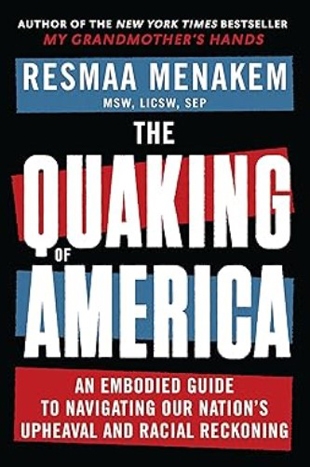On January 6, 2021, bestselling author and renowned therapist Resmaa Menakem was working on a follow-up to his bestselling book My Grandmother’s Hands. Then his wife called him to the television, where he and the rest of the country witnessed a mob of mostly white bodies breaking into the capitol building, assaulting police officers, chanting murderous slogans, and breaching the chambers of the Senate. They asked, “Where’s Nancy?” and the threat was clear. They wanted to “Hang Mike Pence,” and they brought a noose.
In the aftermath of this unprecedented, violent attack on democracy, Menakem expected to see some marked action from white bodies: mass sign-ups for self-defense courses or an uptick in gun sales. Neither happened. All evidence to the contrary, white bodies seemed to still feel safe, protected by White Body Supremacy, or WBS.
In that moment, in fact, the fiction of race seemed to have endured the ultimate test: Was the idea of whiteness, codified to quell class rebellion and unite whites against blacks in the late 17th century, embedded enough 350 years later to convince white bodies they had nothing to fear from other white bodies?
It was.
For Menakem, the side effects of WBS on white Americans had never been clearer: naivete, immaturity, blindness, spiritual bypassing — a denial of race and history so impenetrable it rendered white bodies immune to attention, presence, and connections. In a phrase, it stunted their spiritual literacy.
He worried that all American bodies, but white bodies especially, were ill-prepared for reality.
And our reality, as Menakem urgently writes, is that The Quaking of America is already underway, and to survive it, we will need An Embodied Guide to Navigating Our Nation’s Upheaval and Racial Reckoning.
And so Menakem stopped writing the sequel to My Grandmother’s Hands in order to prepare the bodies of this country to confront the rising tide of authoritarianism. The Quaking of America leads white bodies and bodies of culture (Menakem’s term for non-white bodies) alike through somatic practices that condition their physical systems for conflict and danger, so that we can access the best parts of ourselves and work together to prevent or stem violent rebellion.
For white bodies, accessing the resources to navigate this upheaval requires facing and metabolizing the “racial trauma … stuck inside their bodies” instead of “fall[ing] back on white advantage”; practicing somatic abolitionism (embodied antiracism) individually but also, and crucially, with other white bodies in order to create “a communal container that can collectively hold the charge of race”; and ultimately creating a culture based not on whiteness but on resistance and justice.
As with all of Menakem’s work, this program begins in the body, where racialized trauma lives and vibrates. Menakem methodically walks the reader through the practical steps that lead from the shadow state of WBS to the attention, presence, and connections that will yield a culture of justice and peace. The somatic repetitions build on one another and increase in difficulty and activity as chapters progress.
(Note: this book is not “for” white bodies, but because of the 400 years of WBS, bodies of culture have more experience – what Menakem calls “reps” – adapting their bodily systems to threat and danger. They have not had access to the “advantages” of WBS, namely disconnection, practiced ignorance, and spiritual bypass.)
Initially, it may be difficult for some readers to open themselves to the practices because Manakem’s blunt premise is that we are headed towards a kind of civil war: democratic America versus authoritarian America. Chapter 5 begins with this quote from a former Republican strategist: “An unpunished coup is a training exercise” — certainly sobering language. Our fear-brain might want to flee this and shut down. Our logic-brain might fight it, deem it overstated, and dismiss it.
I struggled with these responses, but Menakem is an attuned somatic therapist, and he works with this resistance in his readers, through argument and evidence but mostly by guiding us to access the wisdom of our bodies. As in My Grandmother’s Hands, Menakem instructs readers to check in with our bodies after each challenging insight about authoritarianism, racialized trauma, and the reckoning that will spike no matter the result of the 2024 election.
Menakem is a challenging and compassionate therapist-in-print, a trustworthy anchor in a time when public trust is eroding. If we can settle our bodies, sit with the pain, fear, and anxiety, and turn one more page, the spiritual benefits are a greater sense of self-awareness, grounded bodies, deeper connections to others, a “toy box” of resources, and hope for democracy and justice.
